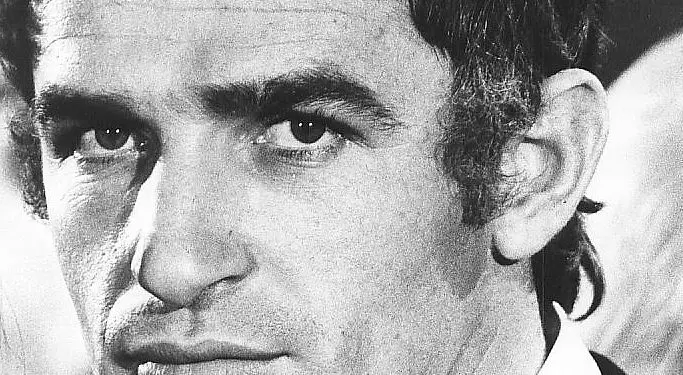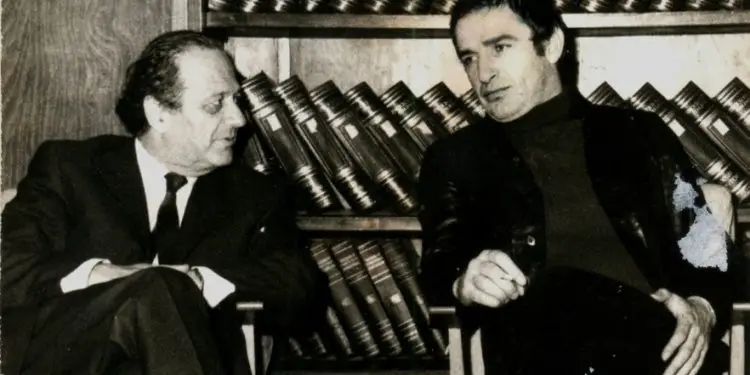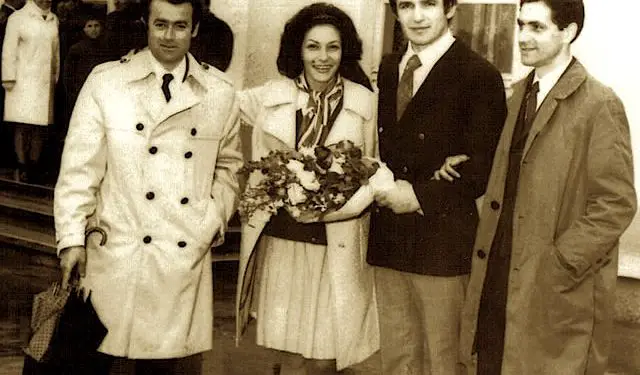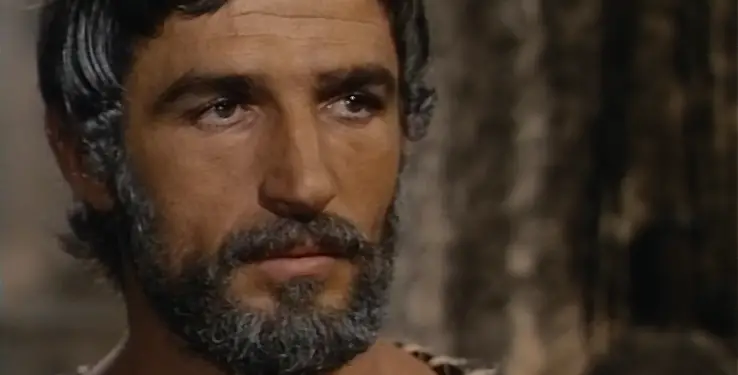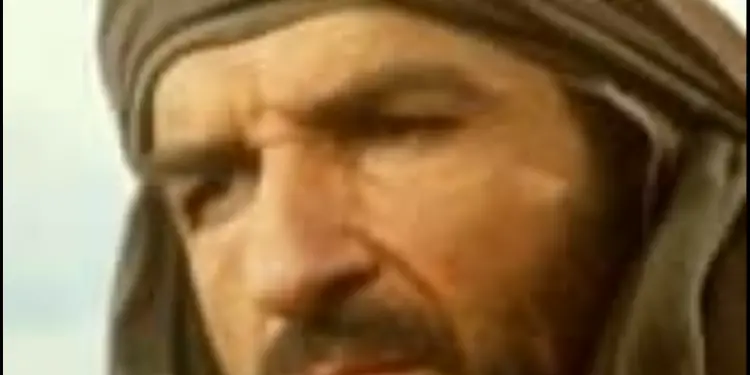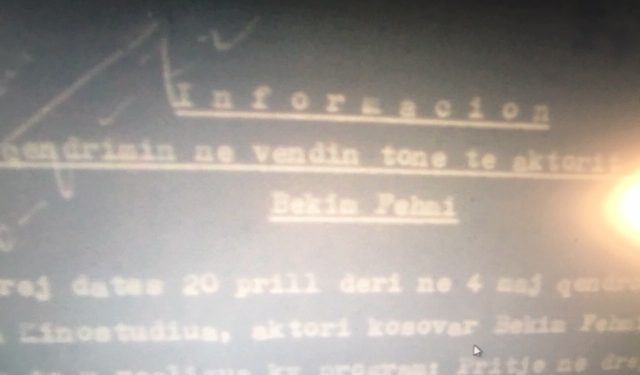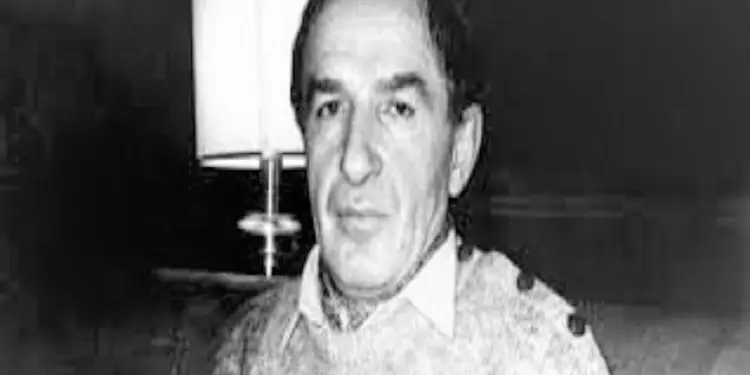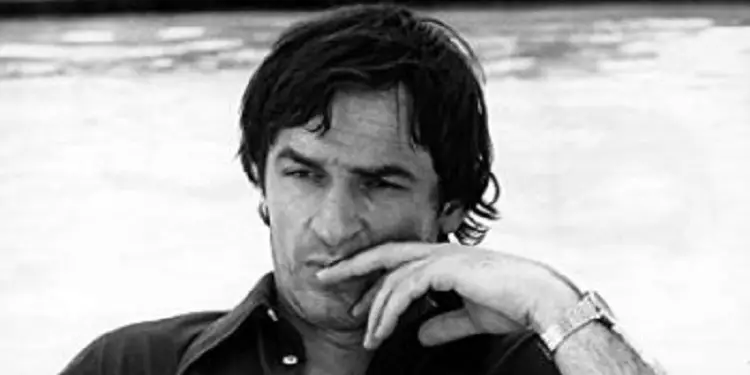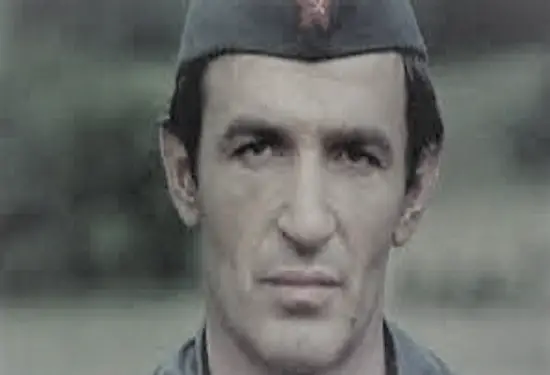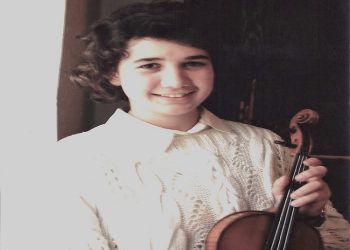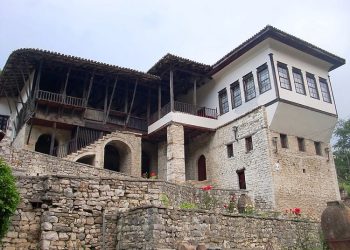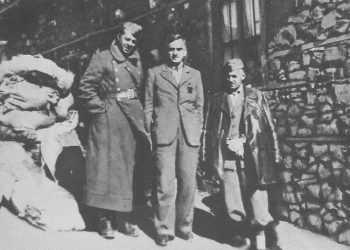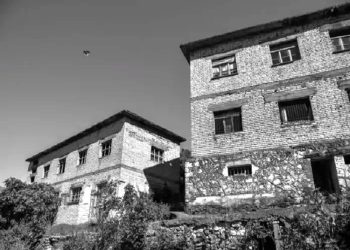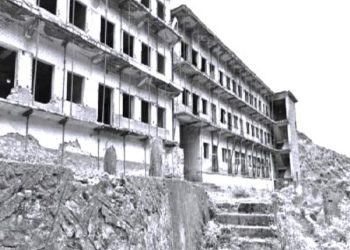Dashnor Kaloçi
Memorie.al publishes the secret report of the State Security realized through the Directorate of Intelligence at the Ministry of Foreign Affairs, (5th Directorate) which is dated May 15, 1972, where intelligence agents, surveyed, intercepted and recorded (with operative technique) all the conversations of the famous Albanian actor from Kosovo, Bekim Fehmiu, during the three-week period that he stayed in Albania. What did the famous actor say about Kosovo, Yugoslavia, Tirana, Pristina, Josif Broz Tito and Enver Hoxha and other conversations he had with art and culture personalities during meetings with them…
In this article we are publishing the document of the 5th Directorate of State Security (at the Ministry of Foreign Affairs) regarding the continuous surveillance and interception of the world-famous Albanian actor Bekim Fehmiu, during his two-week visit to Albania in May 1972. The late ’60s and early’ 70s would mark a “melting ice” in terms of political, economic, and especially cultural relations between Tirana and Belgrade. The attack of the Warsaw Pact forces on Czechoslovakia in 1968, as well as the full guarantee that the communist leader of Yugoslavia Josip Broz Tito gave to Enver Hoxha that “Yugoslavia will not become a springboard territory in case of occupation of Albania by Soviet troops”. as well as the “successful completion” of the Kosovo Albanian demonstrations in 1968, after the granting of extended autonomy and the opening of the University of Prishtina, would have a positive impact on the improvement of these often-tense relations.
During this period between Albania and Kosovo, an important stage of mutual exchange of high-level government delegations, education and science, various cultural and artistic groups, well-known singers and actors, as well as athletes, would begin as never before. well-known on both sides of the border. Such exchanges would take place not only between Albania and Kosovo, but also between Albania and the Albanians of Macedonia, Montenegro, and Serbia. In this framework of cooperation, on April 20, 1972, the world-famous Albanian (Kosovar) actor Bekim Fehmiu came for a two-week visit to Albania. During this visit, Bekim Fehmiu would be accompanied by the highest Albanian personalities of art and culture throughout the agenda of his meetings in our country, such as Deputy Minister of Culture, Mantho Bala, Director of Kinostudio, Todi Bozo, director Dhimitër Anagnosti, famous writer, Ismail Kadare, President of the Writers’ League, Dhimitër Shuteriqi, writer and poet Dritëro Agolli, director of the People’s Theater, Esat Oktrova, etc.
Bekim Fehmiu, by then, had undoubtedly become an indisputable idol not only for the Albanians of Albania but also for those abroad, up to the borders of the diaspora. The world-famous Albanian actor would become famous first in Yugoslav cinematography and then in European and world cinema with his masterpieces “Morgan A Suitable Case for Treatment” (1966), “Odissea” (1968), alongside the Greek actress (originally Albanian) Irene Papas, “The Adventures” (1970), “The Deserter” (1971), “Permission to Kill” (1975), “Black Sunday” (1977), and other world-famous masterpieces such as “Disperamente Giulia” (1989). But Bekim Fehmiu throughout his visit to Albania and specifically in the League of Writers and Artists, Kinostudio “Shqipëria e re”, Art Gallery, National Historical Museum, Exhibition “Albania Today”, Opera and Ballet Theater, etc. would be monitored and was constantly intercepted by ubiquitous State Security men disguised as “diplomats,” “journalists,” and his “companions.”
The State Security in the report that it sends to its V Directorate with director Jonuz Mersini (at the Ministry of Foreign Affairs) notes in detail all the conversations and personal attitudes of the great actor, about the whole course of political-economic and cultural relations between Albania and Yugoslavia, especially between Albania and Kosovo. In this detailed report is mentioned the kindness and sincerity that Bekim Fehmiu shows for any kind of positive progress in the relations between Tirana and Prishtina. But even with all these praises and his benevolent attitudes towards Albania, Bekim Fehmiu would be strictly observed with distrust by the State Security employees, as “it should not be forgotten” that he came from Yugoslavia, one of the country’s most politically attacked by the regime. of Enver Hoxha until that time.
Throughout his visit to Albania, and until his departure from Tirana on 4 May 1972, Bekim Fehmiu never realized that he would be monitored and intercepted at all his meetings and walks by the State Security. And this is because so far, no official document is publicly available to best prove this fact. And in all likelihood, he fled to the afterlife without ever learning that fact. Bekim Fehmiu himself would return to Albania in 2000, as an honorary guest at a concert at the Palace of Congresses, but this time unsupervised by anyone. The great world-famous Albanian actor would publish his memoirs in the book ” Shine and horror “, (translated by the diplomat and at the same time the best connoisseur of Slavic languages in Albania), Xhelal Fejza, in 2012, two years after Fehmi’s death at his home in Belgrade.
In these memoirs, Fehmiu dedicates a whole chapter to his important visit to Albania in 1972, as well as recalls with nostalgia the cultural relations of Tirana with Prishtina in the communist period. The State Security Report on the interceptions of Bekim Fehmiu, realized through the 5th Directorate of the Ministry of Foreign Affairs, we are publishing in full together with the report of the Culture Sector, while from the memoir book “Splendor and horror”, published in 2002 in Belgrade, we have selected some excerpts, mainly those related to his visit to Tirana and some other districts of the country where he was received with great honors.
Report of the Culture Sector for Bekim Fehmiu
Information from the meeting with the Kosovar artist Bekim Fehmiu
He thanked for the warm reception and said expressly:
“I feel at home.”
During these three days he has had meetings in Kinostudio, in the League of Writers and Artists, has seen some Albanian feature films, the Ensemble of Folk Songs and Dances, the big exhibition “Albania in 1971”, the Art Gallery, the Museum of the National War- Liberation and Archaeological Museum of Durrës, etc.
In the meeting with Comrade Mantho about all that he saw and learned during these days in our country, he expressed himself with warm words.
He said that our achievements are really great, especially when comparing them with the miserable situation of Albania in the period of Zog, which he called primitive feudalism. He said for Kosovo that it would be enough to reach the situation where Albania has reached today in the field of Education and Culture. Speaking about the past of our country, he said that there was no one more bitter luck than Albania and the Albanians, there was no Balkan and world war that did not cross these territories across Albania. And yet Albanians live by name in the world. He added that because of vitality and ability there is no other people in the world like the Albanian people.
He praised the many connections, the growth of the Albanian population and the average age in our country. After talking about the current population in our country, he added to this number one million Kosovo Albanians (according to the latest census, which he called more or less objective). Wanting to express his satisfaction for the increase of Albanians, he humorously noted that he will have 12 children.
He said that a lot has been said and introduced about the theory of Marx, Engels and Lenin, but Albania is an example in this regard. You are characterized by a modesty that is imposed.
Speaking about the successful fight against illiteracy in Albania, he underlined the difficult situation in Yugoslavia, where the problem of illiteracy is becoming more and more acute. He noted that there are now about 40 per cent illiterate in Belgrade.
In his conversation, he stressed that in the exchanges with Kosovo, the concrete circumstances should be taken into account and reiterated that in the groups coming to Albania, Serbian and Montenegrin elements should also be accepted. He hinted that this is necessary in relations with Kosovo. In the conversation with Comrade Mantho, he used the expression “to work with the copy” several times, by which he meant that we should use an elastic tactic, which would provide the necessary cooperation for the Albanian cause.
On this issue he hinted that he was concerned. Comrade Mantho told him that in the Kosovar groups that came to Albania, Serbs, etc. also participated.
He highly appreciated the attitude and work of our professors at the University of Prishtina (there is a lecturer brother at this university). With their good work, simplicity and seriousness, they have also influenced local educators to properly understand their role. By this he hinted at the need for the predominance of patriotic feeling in them.
Throughout the conversation he implied that he nurtured deep patriotic feelings. He spoke lovingly about his father’s work as a teacher, the pioneer of the Albanian school in that province, his sister, also a teacher, etc. He mentioned that when he went to get the visa, they had told him that he had nothing to learn in Albania. On this occasion, he stressed that they also told Aleksandër Moisiu: What does he love Albania and they tried to show that he was not Albanian. He mentioned that he himself has made clear the Albanian nationality and has not accepted the calf suffix at all.
He assessed the fourth plenum positively, according to him, helped the issue of Kosovo.
Regarding the situation in Yugoslavia, he noted that the dollar and the dinar operate at a great strength. Mention numerous cases of theft by company executives. Mention that these thieves of millions of dollars are not punished, easily punished, get out and come back to work responsibly.
Highly appreciated our films from a technical point of view and made artistic remarks. He said that the film should have as little declarative character as possible, that today’s Albanian should feel better and stronger, that the rhythm of the film and its dynamics should be intensified.
Coming out he mentioned the proverb that “fish stinks from the head”. On this occasion, he noted that with the marked realities, Albania is moving forward. On this occasion, he wanted to point out that when Albania is on the right path, this is also in the interest of Kosovo.
During the conversation, Bekimi asked about the ways of preparing art staff in our country, such as quantity and quality, noted the need felt today in Kosovo and asked for help in this area from our country.
Comrade Mantho during this meeting spoke extensively about the successes achieved in the field of education and culture, the difficulties encountered and the ways that have been followed to overcome them. He spoke about the ancient traditions in the field of art and culture of our people, about the care shown for this, about the great perspectives in the field of education and culture. He also spoke about the great achievements in the economic and social field as well as the ways and forms of work that have been used in our country in the preparation and qualification of the staff, especially those of culture and art.
Comrade Mantho also spoke about the exchanges that have taken place in the field of Education and Culture in relations with Kosovo and expressed our satisfaction and readiness to further strengthen them.
24.IV.1972 F. Hobdari J. Mato
State Security Report for Bekim Fehmiu
Information on the stay in our country of the Kosovar actor, Bekim Fehmiu
From April 20 to May 4, the Kosovar actor, Bekim Fehmiu, stayed in our country, invited by Kinostudio. During this period, this program was realized with him:
Reception at the Directorate of Kinostudios, which was attended by some artistic staff, after the meeting visited several departments of Kinostudios and assisted in the shooting of a feature film. Meeting in the League of Writers and Artists with comrade Dhimitër Shuteriqi, Ismail Kadare, Dritëro Agolli, Llazar Siliqi, etc. Watch the performance of the Folk Song and Dance Ensemble and talked to the ensemble artists, after the performance. Watching the feature films “Mountains with covered shopping”, “When a day dawned”, and “Albanian dancing”.
Visit to the Art Gallery and talk with painters Foto Stamo, Abdurrahim Buza etc.
Visit to the exhibition “Albania in 1971”. In the Museum of the National Liberation War, in the Mausoleum in Durrës, as well as in the Archaeological Museum.
On the 24th, a reception was organized at the Ministry of Education and Culture by Comrade Mantho Bala.
Visit to Kruja, the castle and the castle museum
Visits to Gjirokastra and to the museum house of comrade Enver, to the weapons museum and around the city. Watching the play “House on the Boulevard”, performed by the professional theater of Gjirokastra.
Visit to Saranda, Butrint and Vlora. In Fier he visited Azotik and Apollonia.
Visit to Shkodra, the Wire Factory and Vaun e Dejës.
Meeting and conversation with the actors of Tetri “Migjeni” and visit to the house of Bajram Curri’s wife.
After returning from Shkodra to Tirana, he assisted in the premiere of the movie “Long Nights Stars”. Assisted in the May 1 parade. There was a TV interview. On the second day, he walked in the big park where the popular manifestation took place.
The movie “Odyssey” was shown to Kinostudio for teachers and students. After the film a conversation took place, simply about professional problems. Without the appearance of the Institute of Arts, “Star without a name”.
On the last day he had a conversation with the creative team of Kinostudios, on professional problems and in the afternoon, he assisted in the rehearsal of the part “The General of the Dead Army”. After the rehearsal, there was a short meeting with the staff of the People’s Theater, where they mainly talked about the show and Bekim Fehmiu made some professional and artistic remarks which the theater friends found appropriate.
From all his attitude before and from his expressions during the time he stayed here, there seemed to be a deep sense of Albanianism. In the book of impressions of the Museum of Weapons of Gjirokastra, where he found exhibited a photograph of the raising of the flag in Vlora, in which his father also appeared, he wrote:
“I am proud to be Albanian.” He constantly showed this sense of pride that he is Albanian. After the performance of the Song and Dance Ensemble, he said: “Come out, girls and boys, shake it and let the whole world know who we are…”. “It would be good to come there to Belgrade and give a show to fill the biggest stadium in Belgrade.” He greatly appreciated and expressed this constantly, the care shown to us for man, for health and education. He was very enthusiastic about such successes of our country, such as the eradication of illiteracy, electrification, etc. (in these cases he did not hesitate to cite numerous negative examples of theft and corruption, large pay gaps, illiteracy that now occupies 40 percent of the population in Belgrade, and others for present-day Yugoslavia).
He said: “We love our Kosovo very much, but we love our mother Albania more and we must, in every way, pass us in Kosovo”.
During various conversations about the progress of our country, he spoke lovingly of our leaders. He had a great desire to see his friend Enver Hoxha and he was worried that he did not see him properly on the May 1st holiday. He highly appreciated the care and expenses that the state made for archeological discoveries, for the preservation and maintenance of works of art, museums, etc.
He was very eager to learn as much as possible from the ancient history and present-day advances of our country. He was always enthusiastic about anything he liked. When he saw Butrint and Saranda, he said: “These are wonderful places, I will tell all Kosovars to come and rest here”./ Memorie.al
Continues tomorrow




